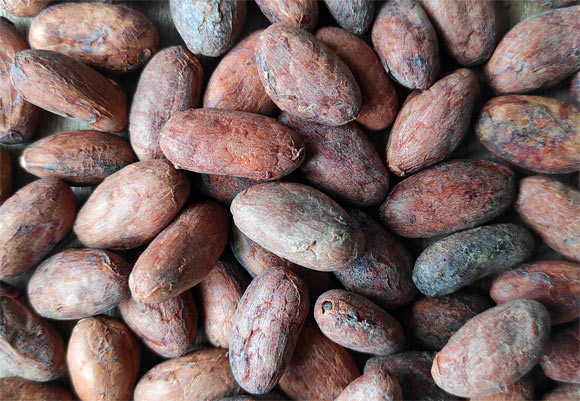New research led by Professor Christian Heiss from the University of Surrey and NHS Healthcare Trust reduces concerns that cocoa as a treatment for raised blood pressure could pose health risks by decreasing blood pressure when it is not raised.

Bapir et al. confirm that cocoa can decrease blood pressure and arterial stiffness in everyday life when elevated within the normal range. Image credit: Sci-News.com.
“Epidemiological data suggest that there is an inverse relationship between the consumption of flavonoid-rich diets and the risk for cardiovascular disease,” said Professor Heiss and his colleagues from the University of Surrey and King’s College London.
“Significant associations were also observed for one subclass of flavonoids, the flavanols, and their oligomers, the procyanidins.”
“Dietary intervention studies with flavanol and procyanidin-containing foods support this notion, as the consumption of these foods improves arterial endothelial function while lowering blood pressure and arterial stiffness in healthy subjects.”
“However, the clinical intervention studies were performed in tightly controlled experimental settings, and in particular, effects on blood pressure show large heterogeneity between trials and suggest that baseline blood pressure may play a role in the effect of cocoa on blood pressure,” they added.
“As participants’ responses were only measured once at specified times after single or repeated ingestion of interventions in the lab, individual responses were not investigated at different days and not during real life.”
“A profound understanding of inter- and intra-individual variability of responses in real life is an important area of research in a world that aims at personalized nutrition and medicine.”
The researchers set out to investigate the use of cocoa flavanols in lowering blood pressure and arterial stiffness in individuals outside of clinical settings.
For several days, 11 healthy participants consumed, on alternating days, either 6 cocoa flavanol capsules or 6 placebo capsules containing brown sugar.
The participants were provided with an upper arm blood pressure monitor and a finger clip measuring pulse wave velocity (PWV) which gauges levels of arterial stiffness.
Measurements of blood pressure and PWV were taken prior to consumption of the capsules and every 30 min after ingestion for the first 3 hours, and then hourly for the remaining 9 hours.
The scientists found that blood pressure and arterial stiffness were only lowered in participants if it was high, and there was no effect when the blood pressure was low in the morning.
Significantly, effects were also, for the first time, identified at eight hours after cocoa was consumed.
The authors believe that this second peak may be due to how bacteria in the gut metabolise cocoa flavanols.
“The positive impact cocoa flavanols have on our cardiovascular system, in particular, blood vessel function and blood pressure, is undeniable,” Professor Heiss said.
“Doctors often fear that some blood pressure tablets can decrease the blood pressure too much on some days.”
“What we have found indicates that cocoa flavanols only decrease blood pressure if it is elevated.”
“Working with participants’ personal health technologies showed us how variable blood pressure and arterial stiffness can be from day to day and shows the role of personal health monitors in developing and implementing effective personalised care.”
The findings are published in the journal Frontiers in Nutrition.
_____
Mariam Bapir et al. Assessing Variability in Vascular Response to Cocoa With Personal Devices: A Series of Double-Blind Randomized Crossover n-of-1 Trials. Front. Nutr, published online June 13, 2022; doi: 10.3389/fnut.2022.886597







